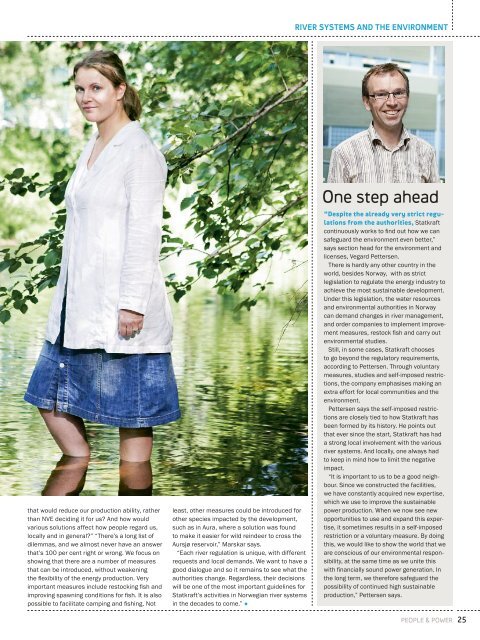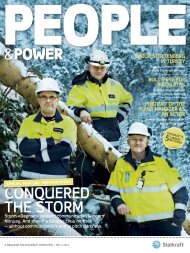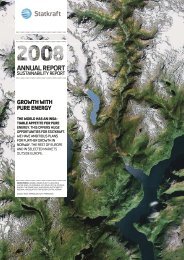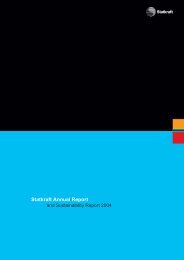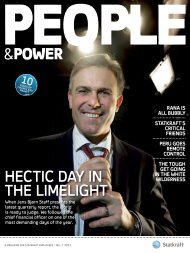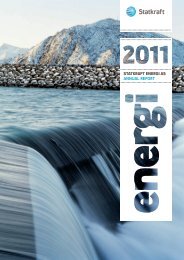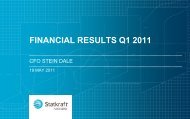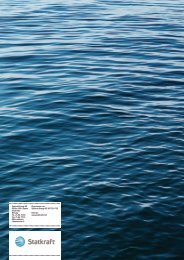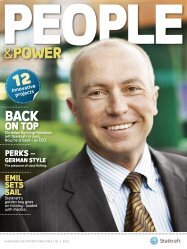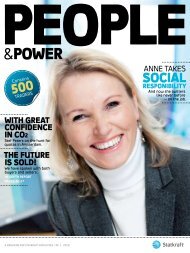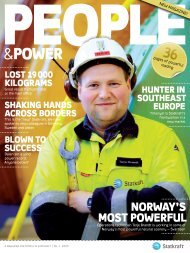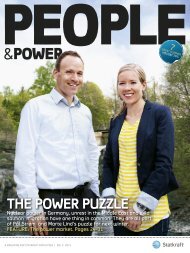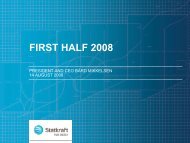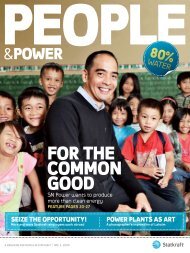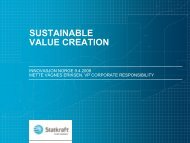No. 3 - 2010 (Download) - Statkraft
No. 3 - 2010 (Download) - Statkraft
No. 3 - 2010 (Download) - Statkraft
Create successful ePaper yourself
Turn your PDF publications into a flip-book with our unique Google optimized e-Paper software.
that would reduce our production ability, rather<br />
than NVE deciding itfor us? And how would<br />
various solutions affect how people regard us,<br />
locally and in general?” “There’s a long list of<br />
dilemmas, and we almost never have an answer<br />
that’s 100 per cent right or wrong. We focus on<br />
showing that there are a number of measures<br />
that can be introduced, without weakening<br />
the flexibility of the energy production. Very<br />
important measures include restocking fish and<br />
improving spawning conditions for fish. It is also<br />
possible to facilitate camping and fishing. <strong>No</strong>t<br />
least, other measures could be introduced for<br />
other species impacted by the development,<br />
such as in Aura, where a solution was found<br />
to make it easier for wild reindeer to cross the<br />
Aursjø reservoir,” Marskar says.<br />
“Each river regulation is unique, with different<br />
requests and local demands. We want to have a<br />
good dialogue and so it remains to see what the<br />
authorities change. Regardless, their decisions<br />
will be one of the most important guidelines for<br />
<strong>Statkraft</strong>’s activities in <strong>No</strong>rwegian river systems<br />
in the decades to come.” ●<br />
river systems and the environment<br />
One step ahead<br />
“despite the already very strict regulations<br />
from the authorities, <strong>Statkraft</strong><br />
continuously works to find out how we can<br />
safeguard the environment even better,”<br />
says section head for the environment and<br />
licenses, Vegard Pettersen.<br />
There is hardly any other country in the<br />
world, besides <strong>No</strong>rway, with as strict<br />
legislation to regulate the energy industry to<br />
achieve the most sustainable development.<br />
Under this legislation, the water resources<br />
and environmental authorities in <strong>No</strong>rway<br />
can demand changes in river management,<br />
and order companies to implement improvement<br />
measures, restock fish and carry out<br />
environmental studies.<br />
Still, in some cases, <strong>Statkraft</strong> chooses<br />
to go beyond the regulatory requirements,<br />
according to Pettersen. Through voluntary<br />
measures, studies and self-imposed restrictions,<br />
the company emphasises making an<br />
extra effort for local communities and the<br />
environment.<br />
Pettersen says the self-imposed restrictions<br />
are closely tied to how <strong>Statkraft</strong> has<br />
been formed by its history. He points out<br />
that ever since the start, <strong>Statkraft</strong> has had<br />
a strong local involvement with the various<br />
river systems. And locally, one always had<br />
to keep in mind how to limit the negative<br />
impact.<br />
“It is important to us to be a good neighbour.<br />
Since we constructed the facilities,<br />
we have constantly acquired new expertise,<br />
which we use to improve the sustainable<br />
power production. When we now see new<br />
opportunities to use and expand this expertise,<br />
it sometimes results in a self-imposed<br />
restriction or a voluntary measure. By doing<br />
this, we would like to show the world that we<br />
are conscious of our environmental responsibility,<br />
at the same time as we unite this<br />
with financially sound power generation. In<br />
the long term, we therefore safeguard the<br />
possibility of continued high sustainable<br />
production,” Pettersen says.<br />
people & power 25


